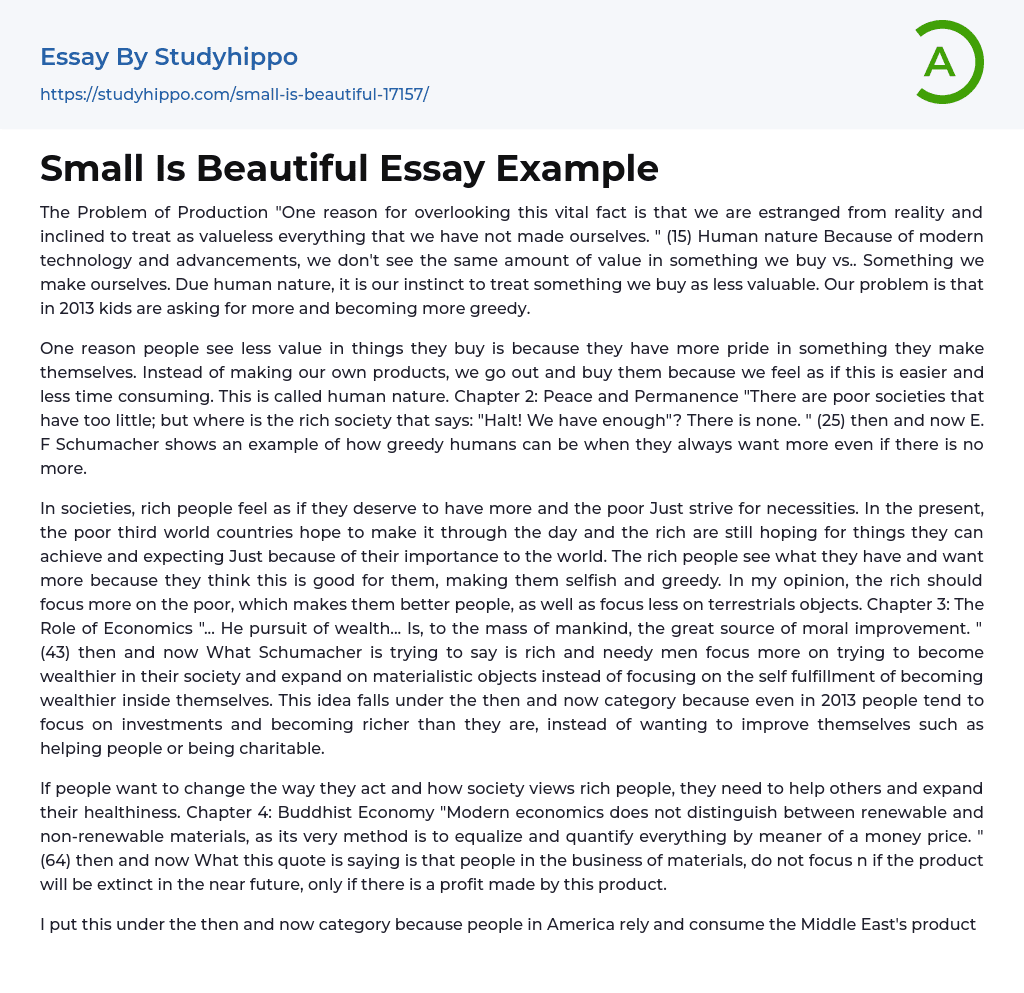The Problem of Production "One reason for overlooking this vital fact is that we are estranged from reality and inclined to treat as valueless everything that we have not made ourselves." (15) Due to human nature, the value we perceive in something we buy is diminished compared to something we create ourselves. In 2013, children are becoming more greedy and asking for more, which is a manifestation of this problem.
One reason for people undervaluing things they purchase is the pride associated with creating something themselves. Instead of taking the time and effort to make our own products, we opt for the convenience of buying them. This behavior is a result of human nature.
Chapter 2: Peace and Permanence "There are poor societies that have too little; but where is the rich society that says: "Halt! We have enou
...gh"? There is none." (25) In societies, affluent individuals feel entitled to more, while those who are poor simply strive for their basic needs. Currently, impoverished third world countries struggle to survive day by day, while the wealthy continue to pursue additional achievements and acquisitions due to their perceived importance.
The desire for more wealth among the wealthy leads to selfishness and greed. Instead, the rich should prioritize helping the poor and focus less on material possessions. In Chapter 3, Schumacher argues that pursuing wealth is seen as a means of moral improvement. This idea applies to both past and present, as people continue to prioritize becoming wealthier rather than striving for inner fulfillment or helping others. To change society's perception of the rich, individuals should prioritize assisting others and focusing on their own well-being. Chapter
explores the Buddhist Economy, which criticizes modern economics for not distinguishing between renewable and non-renewable resources and measuring everything in terms of monetary value rather than considering long-term sustainability.
This text is categorized as "then and now" because Americans heavily depend on and consume oil products from the Middle East while also exploiting our limited oil supply. This excessive consumption leads to increased profits without regard for the potential extinction of resources. It is necessary to restrain our resource purchase and persuade people to abandon their greed for unsustainable items.
- Finance essays
- International Business essays
- Macroeconomics essays
- Barriers To Entry essays
- Microeconomics essays
- Pricing essays
- Profit essays
- Consumerism essays
- Export essays
- Free Trade essays
- International Trade essays
- Compensation essays
- Monopoly essays
- Trade essays
- Industry essays
- Warehouse essays
- Economic Development essays
- Economic Growth essays
- Inflation essays
- Taxation essays
- Central Bank essays
- Monetary Policy essays
- Economy essays
- Gross Domestic Product essays
- Recession essays
- Capitalism essays
- Economic System essays
- Materialism essays
- World economy essays
- American Dream essays
- resources essays
- Max Weber essays
- Employment essays
- Minimum Wage essays
- Unemployment essays
- Human Development essays
- Income Inequality essays
- Economic Inequality essays
- Money essays
- Financial Accounting essays
- Market Segmentation essays
- Supply And Demand essays
- Purchasing essays
- Forecasting essays
- Legacy essays
- Bank essays
- Corporate Finance essays
- Financial News essays
- Financial Ratios essays
- Financial Services essays




